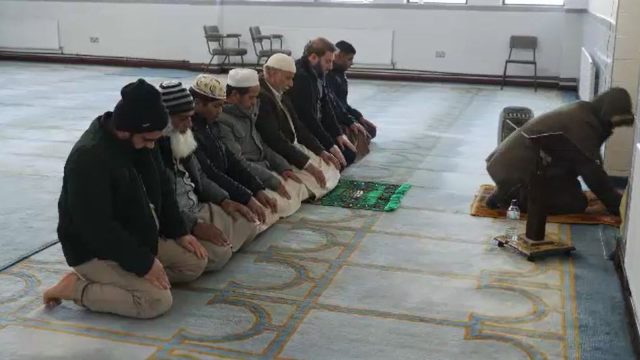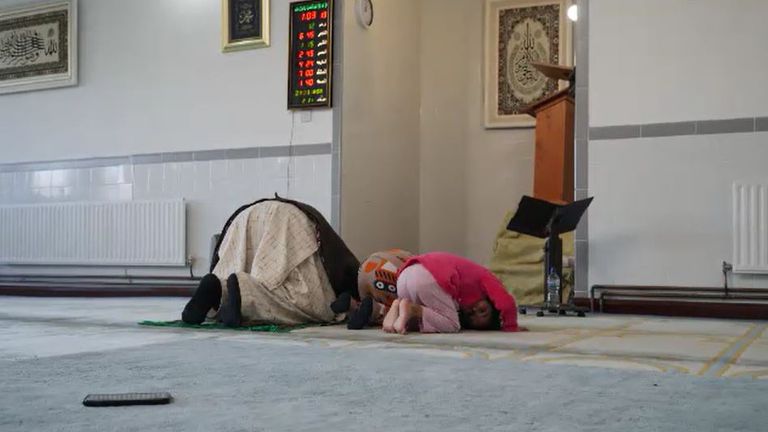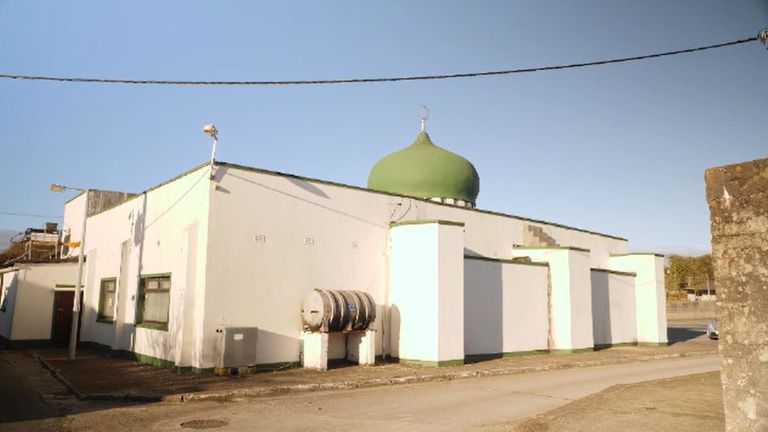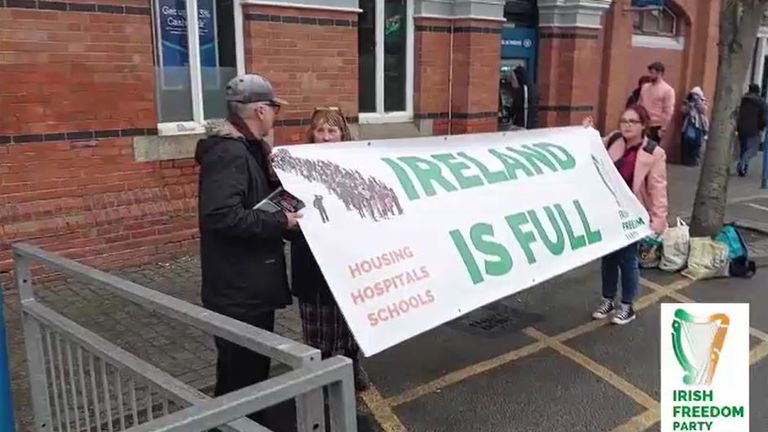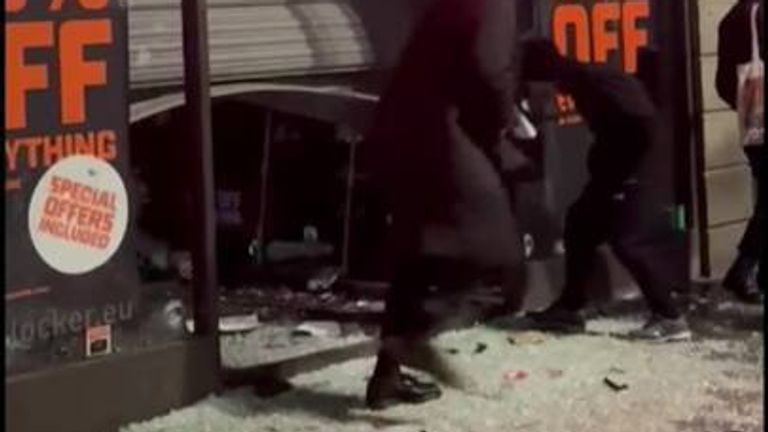Iqbal Chaudry bellows the adhan, or Muslim call to prayer, as his young grandchildren Ali, five, and Aaleen, three, giggle and play on the carpeted floor.
Outside the faithful start to arrive, walking down Mosque Road in pale winter sunlight, breath fogging. Mr Chaudry is from Pakistan. Mohammed Cherbatji is from Syria. The beaming imam is Sudanese.
All of them are standing in Ireland’s first purpose-built mosque, in Ballyhaunis, Co Mayo. It was constructed in 1986 to facilitate the town’s growing Muslim population.
Ballyhaunis, in the west of Ireland, experienced immigration long before the rest of the country, thanks to the opening of a halal meat plant by a Pakistani businessman in the 1970s.
Now, almost 40% of the population was born abroad. When you factor in the second and third generations born in Ballyhaunis, it is easily Ireland’s most diverse town, a fact recognised by the Central Statistics Office (CSO).
It’s also hailed as an integration success story.
Local businessman, Tom Forde, says: “It’s something we’ve grown up with. We’ve always been used to different nationalities in Ballyhaunis.”
He adds: “The bottom line is that we’re all the same. It doesn’t matter the colour of your skin, your religious background, we just manage to get on with it.”
Mr Cherbatji moved from Aleppo in Syria to Ireland as a child. Now 45 and a naturalised Irish citizen, he runs a successful meat processing business with his brother Omar.
“The locals were very friendly,” he recalls. “We mixed together with sport and different festivities. There’s always an acceptance from the local native Irish, if we can say that.”
Immigration ‘seems to be out of control’
But even here, the recent surge in immigration to Ireland hasn’t gone unnoticed, and Mr Cherbatji is open to voicing concerns.
“In the last two or three years, it seems to be out of control, the level of immigration,” he says.
“There are no strict controls like there were before. I don’t know what’s changed regarding the government side of it.
“Look, immigration is okay, but as long as it’s controlled, as long as there is Garda [police] vetting behind it.
“We don’t want people who have dangerous backgrounds, or some sort of different backgrounds, landing as your next-door neighbour.”
Migration to Ireland has boomed in recent years. Figures from the CSO show that in the year up to April 2023, the number of immigrants to Ireland was more than 140,000, a 16-year high.
When the number of emigrants was stripped out, there was net inward migration of 77,600, a 50% increase from the year before.
Immigration has recovered since the end of the COVID-19 pandemic restrictions, and almost 100,000 Ukrainians have arrived in Ireland since the Russian invasion.
The 2022 census revealed that the number of people who live in Ireland but were born elsewhere now stands at 20% of the population.
That means that more than a million people in a country of 5.1 million are immigrants.
Emerald Isle of emigrants must face up to changes
It’s a complete sea-change in a place where the modern national identity was forged by emigration and colonial oppression. Swathes of Irish culture are founded on the emigrant story – in song, literature and generational memory.
Millions left the island to seek a better life abroad, and to form the formidable Irish diaspora. Emigration outstripped the birth rate, and the population plummeted to under three million by 1961.
Immigration – of the Irish – is why the Chicago River turns green every March, why Gaelic games are played from New Zealand to London, and why US presidents hurry to the Emerald Isle to lift a pint of stout before the cameras.
Then, beginning in the 1990s, the tide began to change. Ireland’s economic boom brought unprecedented prosperity, and for the first time ever, Ireland was a destination for migrants.
It was the last EU member state to attain a net positive migration rate.
That trend – lasting until around 2010 – dipped after the collapse of the house of cards that was the Celtic Tiger, but has now roared back.
And yet somehow, in those three decades, immigration has never been a major political issue in Ireland, in sharp contrast to its nearest neighbour.
While the UK has grappled with contentious migration legislation, “stop the boats” pledges and the Rwanda policy, immigration has barely featured in public discourse across the Irish Sea.
Now, that could be about to change.
‘If every asylum seeker left, we’d still have problems’
Anne Holohan, a professor of sociology at Trinity College Dublin, says immigration is now serving to underline the already existing societal problems in Ireland.
“We’ve seen an uptick in the number of asylum seekers,” she says. “And the increasing number of asylum seekers has highlighted problems in Irish society, but they have not caused these problems.”
“These problems are the inability of the government to provide housing, community infrastructure, services – particularly a fair and efficient health service to every person living in this country.
“So if every asylum seeker left this country tomorrow, we’d still have those problems.
“It’s the policy vacuum that’s the fundamental cause of the tensions that we’ve seen in the past few weeks.”
Alongside the folk memory of generations of emigration, Ireland has always prided itself as a land of welcoming openness; the cead mile failte (“one hundred thousand welcomes”) is a core part of the country’s international brand.
But over the past few years, rumblings of discontent at the number of new arrivals could be discerned, although you often had to know where to look.
‘We need to discuss unsustainable levels of immigration’
Small-scale community protests against planned refugee centres started to sprout up across the country.
Unsavoury anti-immigration voices began to coalesce on social media and messaging apps, often leading to all immigration dissenters being branded “far-right”, or at least, feeling branded far-right by the country’s establishment.
Independent TD (member of parliament) Carol Nolan says she’s been described as far-right for raising her concerns about the “unsustainable” rate of immigration.
She claims that there’s a lack of political debate on the issue.
“I feel that in Britain the parliamentarians are doing their jobs,” she says. “That’s what the people want raised on the floor of the House of Commons, and this parliament, our Dail, should be no different. We need to discuss those issues.”
“We want a mature and reasonable debate. We’re at a point where we’re in a housing crisis and we’re seeing unsustainable levels of immigration.
“I welcome the opportunity to discuss the issues that people find difficult, we have to be mature enough to do that.”
Dublin attack and riots came after growing discontent
After the end of the pandemic, many anti-lockdown campaigners pivoted to another tenet of the culture wars: immigration.
“Ireland is full” made its mark as a hashtag online and a slogan at sporadic street protests.
But by now, polling revealed that legitimate concerns over Ireland’s ever-increasing rate of immigration were also gaining more mainstream traction.
In May this year, figures from marquee pollsters Red C found that 75% of respondents thought Ireland had taken in too many refugees.
The size of the majority caught some in Irish public life by surprise.
Just last Sunday, an Ireland Thinks/Sunday Independent poll found 28% of people said they would consider supporting a political party with “strong anti-immigration views” – twice as many than when the question was last asked in 2021.
Then there was the stabbing attack – believed to have been perpetrated by a man originally from Algeria – in Dublin city centre on 23 November.
Three young children and their carer were injured. A five-year-old girl and the carer remain seriously ill in hospital.
Anti-immigration rhetoric started immediately afterwards online, and led to violent confrontations in the city.
Eventually, aided by opportunistic thugs, a full-blown riot developed.
Read more:
34 arrested after violent protests in Dublin
McGregor ‘made a scapegoat’ for riots
Hero nurse says attack unfolded ‘in slow motion’
‘You don’t feel protected’
The past few weeks have been a worrying time for many immigrants in Ireland.
Dublin Bus driver Cristian Tei is originally from Romania but has been living in Ireland for 20 years.
He told us Dublin “is getting more and more difficult to work in”.
One of his colleagues, also an immigrant, was dragged from his bus on O’Connell Bridge on the night of the riot and abused.
The bus was set alight.
“Emotionally he’s not okay,” says Cristian, “but hopefully with help he gets through this and comes back to work.”
He adds: “It [racist abuse] doesn’t happen every day, but it’s happening.
“There are moments when you don’t feel safe, you don’t feel protected.
“Because your accent is different, or your skin is a different colour… it shouldn’t be happening. But it happens.”
Ireland no longer immune to impact
Ireland’s political leadership may now be past entertaining a blasé feeling of immunity to the anti-migrant sentiment taking hold in other, larger, European countries.
Immigration may even take its place among health, housing and the cost of living as a key issue in the upcoming general election cycle.
Ireland is still renowned as a land of welcomes, but there is a lack of real political debate on immigration, both to address legitimate concerns, and to fill a vacuum otherwise at least partially occupied by those who seek to exploit division.
As Professor Holohan maintains, migration is “in our ancestral memory”.
She adds: “The problem is not in the number coming, it’s to use our imagination to prepare the country.”

